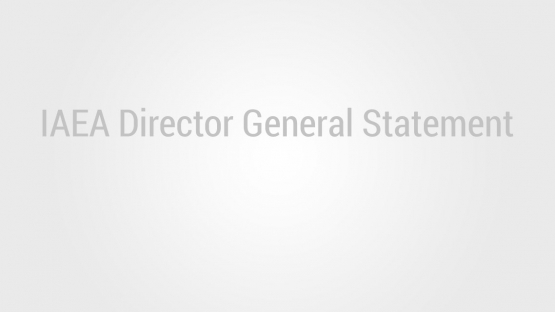Since the Chernobyl accident of 1986, the international community has learned in a painful way that the health and environmental effects of nuclear accidents do not respect national boundaries and that therefore international co-operation in the nuclear safety field is indispensable.
As the global centre for such co-operation, the Agency is making an important contribution to the development of an effective worldwide safety regime that comprises three elements: international conventions prescribing the basic norms for the safe use of nuclear energy; internationally accepted safety standards; and measures to assist States in the implementation of these conventions and standards. In addition, technological solutions for improving safety are being promoted. This year the Agency has also focused on assisting Member States manage the Y2K readiness problem.
It is gratifying to see a movement towards the development of a comprehensive legal system (in areas such as notification and assistance in the case of nuclear accidents, liability for nuclear damage, nuclear power plant safety and the safety of management of spent fuel and radioactive waste). It is also gratifying to see more countries accepting Agency advisory services and the increased openness in general to peer review of safety practices and procedures...
In November 1998, the United Nations General Assembly had before it a report of the Secretary General containing a recommendation that a full radiological evaluation be made of the Semipalatinsk test site. The General Assembly, in resolution A/RES/53/1H, welcomed the report and stressed "the need for greater international attention and extra efforts in solving problems with regard to the Semipalatinsk region and its population". Earlier this month, at an international conference in Tokyo, hosted by the Japanese Government and co-sponsored by the Agency, a number of proposals were considered. Amongst those judged to be a priority, one addressed the need for a comprehensive radiological assessment of the Semipalatinsk site that would build on the preliminary assessment carried out by the Agency. The cost of such a study is estimated to be $3.5 million. The Secretariat will naturally be ready to undertake such an exercise if the required financial resources are available...
Still on safety, I would also like to inform you that in August this year the Executive Director of the United Nations Environment Programme (UNEP) requested the Agency's assistance in a fact finding mission to Kosovo for the purpose of identifying the possible existence of radioactive residues, such as depleted uranium, at specific sites and to evaluate the potential impact of radiation sources which may be out of control in Kosovo. The mission was useful in adding to the knowledge necessary for a comprehensive appraisal of the situation. However, our experts concluded that, owing to the lack of access to relevant information and the prevailing security situation, no conclusive or technically sound assessment of the radiological situation in Kosovo can be carried out at present. The Balkan Task Force concurred with this assessment at its meeting in September. The Agency will naturally continue to be ready to assist in this endeavour...
Finally, under safety, I would like to update you on our work with regard to the Y2K computer problem. As follow-up to the resolution adopted last year by the General Conference (GC(42)/RES/11), the Agency has focused on the Y2K issue in respect of nuclear facilities as well as medical facilities that use radiation sources. We have published guidance documents for dealing with the Y2K issue, organized workshops for the exchange of information with and between Member States, and conducted preparatory and review missions to nuclear power plants at the request of Member States. This work is described in detail in document GC(43)/7.
The information we have received on the situation in nuclear facilities indicates that all Member States have taken measures to put in place a Y2K readiness programme - including assessment, testing, validation and implementation of solutions - by the end of this month. The rest of the year will be devoted to contingency planning...
I turn now to safeguards in the Democratic People's Republic of Korea (DPRK). At the June Board meeting I said that there had been no positive developments with regard to any of the long standing issues. That assessment remains unchanged. The Agency continues, however, to monitor the freeze of the DPRK's graphite moderated reactor and related facilities.
It is now some nine months since the Agency's last inspection in Iraq. As you are aware, the Security Council is currently consulting on a mechanism for the resumption of verification activities in that country. The Agency has an operational plan for the resumption of its verification activities in Iraq and would be able to implement it at short notice once it is in a position to do so. Clearly under present circumstances the Agency cannot provide any measure of assurance regarding Iraq's compliance with the relevant Security Council resolutions...


